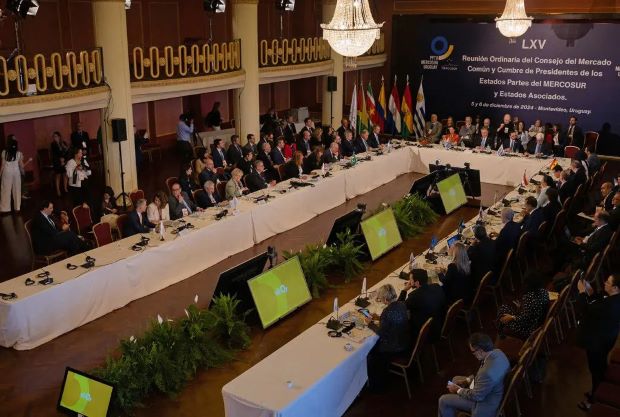As Trump threatens tariffs, Europe and South America strengthen ties
By Jenny Gross, Liz Alderman and Patricia Cohen
BRUSSELS — The European Union reached a major trade agreement Friday (6) with four South American countries, concluding a long-delayed negotiation that took on new urgency as President-elect Donald Trump threatened to impose tariffs on some of the world’s largest economies.
The deal, between the EU and members of Mercosur — a bloc that includes Argentina, Brazil, Paraguay and Uruguay — would establish one of the largest trade zones in the world and would be the EU’s biggest trade agreement ever.
With European leaders preparing for the possibility that Trump’s return to office will lead to a more fragmented global economy, the deal is a significant victory for proponents of free trade, linking markets with more than 700 million people. But it could fuel frustration within the European bloc, with France, the biggest critic of the deal, opposed to the agreement over concerns about the possible dumping of cheap agricultural imports in Europe, which could hurt its farmers.
If ratified by EU member states and the European Parliament, the agreement would lift tariffs on products including meat, cars, wine and chocolate. Despite France’s strong opposition to the agreement, Paris does not appear to have persuaded enough other European countries to vote against it, although it signalled it would still lobby to block it. A date for the ratification vote has not yet been set.
What’s in the trade deal?
With Trump’s election, Europe is facing the threat of high tariffs on exports to the United States, its biggest trading partner, and increased competition from China. Trump has suggested that he would impose tariffs of 10-20% on products around the world and tariffs of 60% or more on Chinese goods.
So European leaders have emphasized the need to diversify trade.
Ursula von der Leyen, president of the European Commission, the bloc’s executive arm, said Friday that the political agreement was a milestone for Europe and South America.
“We both believe that openness and cooperation are the true engines of progress and prosperity,” she said, speaking in Uruguay. “I know that strong winds are blowing in the opposite direction, towards isolation and fragmentation, but this agreement is our clear response.”
Negotiations over the trade deal began 25 years ago and came close to a breakthrough in 2019. Von der Leyen said the agreement would save European companies 4 billion euros ($4.2 billion) in export duties per year.
The prospect of Trump’s tariffs has also made the deal more compelling for the members of Mercosur, who are interested in selling more beef and industrial products to Europe. And China’s intention to increase agricultural production means that a major buyer of Argentine and Brazilian meat and soybeans could reduce purchases.
Bolivia, a member of Mercosur, could join the agreement if it aligns its rules in line with other members of the bloc.
Jacob Funk Kirkegaard, a senior fellow in Brussels at the Peterson Institute for International Economics, said the deal came at a critical moment. “The signal is that, well, the United States may be pulling out of the global trading system, but the rest of the world is intent on pursuing a different route,” he said.
It is a boon for European carmakers and others
Economists say the agreement is critical for Europe, which is facing a disappointing economic outlook, and particularly for Germany, the biggest exporter to the Mercosur region. Tariffs imposed by Trump would exacerbate challenges for major European industries, including the automobile, pharmaceutical and machinery sectors.
European carmakers, including BMW, Fiat, Peugeot and Volkswagen, would benefit from lower tariffs on imports and exports between the two blocs. Novartis, Sanofi and other European pharmaceutical giants would gain easier access to a large market for health care products.
A range of other European industries, such as the luxury sector, tech, construction and banking, would also be able to reach hundreds of millions of consumers.
Chancellor Olaf Scholz of Germany said Friday that an “important hurdle” for the agreement had been overcome. Prime Minister Pedro Sanchez of Spain, which manufactures large quantities of chemicals and pharmaceuticals, said Friday that the agreement would make Europe “more prosperous and resilient.” The Spanish government said the agreement would increase exports by up to 40% and create an estimated 22,000 jobs.
Even if Europe is spared from US tariffs, escalating tension between the United States and China could pose problems for European companies. Business leaders are concerned that if Chinese products are shut out of US markets, a surge of cheap Chinese imports would instead enter Europe or other markets where Europe competes.
Europe needs to prioritize not only the ratification of the South America trade agreement but also trade agreements with other countries and regions, like Britain and Switzerland and nations in the Indo-Pacific region, said Ignacio García Bercero, a former European Commission trade official. The European bloc already has trade deals with most other countries in South America.
South America is also a reservoir of raw materials like lithium, nickel and manganese that are needed for Europe’s transition to green energy.
France opposes the deal out of concern for farmers
France has bitterly opposed the pact, saying it would open Europe’s agricultural markets to cheap food imports, including beef and wheat that use hormones and pesticides that are forbidden in Europe. French farmers, a politically powerful lobby, have joined others across the bloc to denounce what they fear will amount to food dumping that risks their economic survival.
Poland and Italy have also expressed concerns about the deal.
-New York Times



Comments are closed, but trackbacks and pingbacks are open.